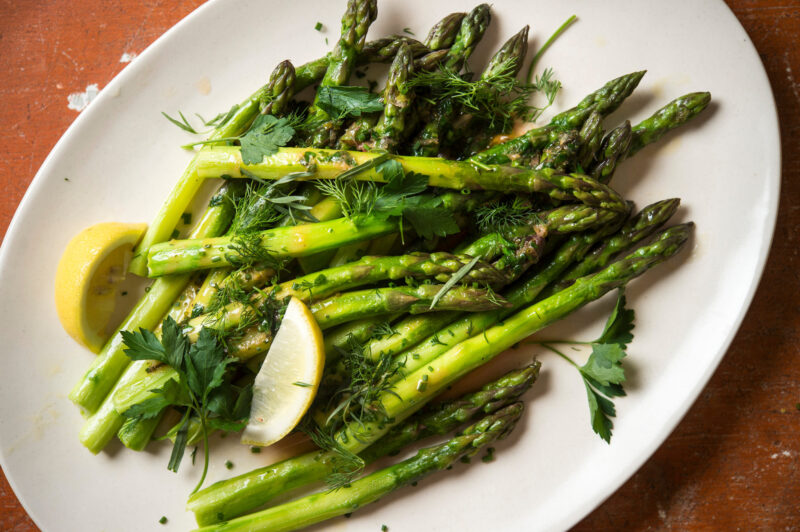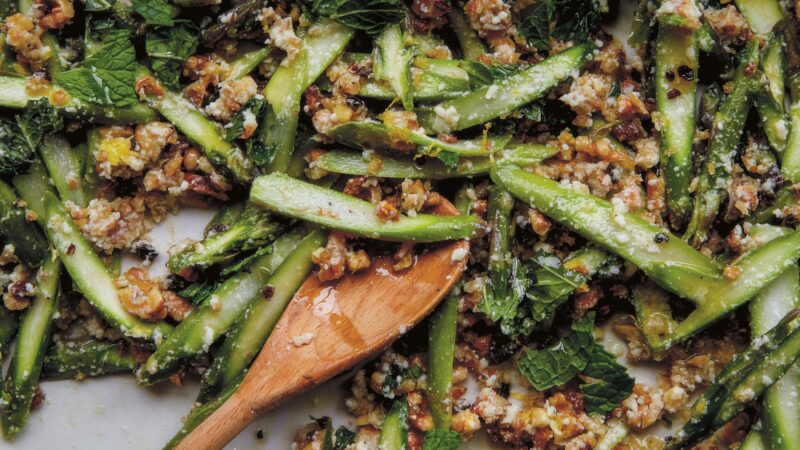Asparagus is a versatile and delicious vegetable that is packed with nutrients. It is high in vitamin K, folate, and antioxidants, such as vitamin C, beta-carotene, and quercetin. Asparagus also contains amino acids that are important for brain development and function.
It is low in calories, fat-free, and low in sodium. While asparagus can be eaten raw, cooking it can enhance its antioxidant activity. However, cooking may also lead to a loss of certain heat-sensitive nutrients, like vitamin C.
It is recommended to cook asparagus using methods that limit exposure to water and heat, such as steaming, sautéing, or quick blanching. Adding raw asparagus to pasta dishes and salads or enjoying it lightly cooked can provide various health benefits.
- Asparagus is a nutrient-dense vegetable high in vitamin K, folate, and antioxidants.
- Cooking asparagus can enhance its antioxidant activity but may lead to a loss of certain heat-sensitive nutrients.
- Methods like steaming, sautéing, or quick blanching can help preserve the nutritional value of asparagus.
- Raw asparagus can be added to pasta dishes, salads, or enjoyed lightly cooked.
- Asparagus is low in calories, fat-free, and low in sodium.
The Benefits of Eating Raw Asparagus
Eating raw asparagus can offer several health benefits. This versatile vegetable is not only delicious but also packed with essential nutrients. Here are some of the key advantages of incorporating raw asparagus into your diet:
- Nutrient-Rich: Raw asparagus is a great source of vitamins, minerals, and antioxidants. It is particularly high in folate, a vital nutrient for healthy cell growth and development.
- Antioxidant Powerhouse: Asparagus contains antioxidants like vitamin C, beta-carotene, and quercetin, which help protect cells from damage caused by free radicals.
- Digestive Health: The fiber content in raw asparagus promotes regular bowel movements and aids in maintaining a healthy digestive system.
- Low in Calories: If you’re watching your calorie intake, raw asparagus is a fantastic choice. It is low in calories but rich in nutrients, making it a weight-friendly food option.
By incorporating raw asparagus into your meals, you can enjoy these benefits while adding a fresh and nutritious twist to your diet. Whether thinly sliced in salads or used as a crunchy addition to pasta dishes, raw asparagus can elevate the flavor and nutritional profile of your meals.
Cooking Asparagus: How It Affects Nutritional Value

When it comes to cooking asparagus, understanding how it affects the vegetable’s nutritional value is essential. Cooking methods, duration of heat exposure, and the type of nutrient can all have an impact on the overall nutritional profile of asparagus.
While cooking can enhance the antioxidant activity of asparagus and increase the levels of certain antioxidants like beta carotene and quercetin, it may also lead to a loss of heat-sensitive nutrients like vitamin C.
The Role of Cooking Methods
The choice of cooking method can make a difference in the nutritional value of asparagus. It is advisable to choose methods that limit exposure to water and heat to minimize nutrient loss.
Steaming, sautéing, quick blanching and microwaving are preferable methods that help retain the nutritional content of asparagus. These methods ensure that the vegetable is cooked just enough to maintain a crisp-tender texture while preserving its essential nutrients.
The Impact on Vitamin C
Preserving the Nutritional Value
To make the most of the nutritional benefits of asparagus, it is important to cook it properly. Avoid overcooking, as it can result in a loss of nutrients and a mushy texture. Opt for cooking methods that retain as much of the vegetable’s nutritional content as possible, such as steaming or sautéing for a short duration. This will help ensure that you can enjoy the delicious taste and reap the health benefits of asparagus.
Raw Asparagus Recipes and Preparation Tips
If you’re looking to incorporate into your meals, there are plenty of delicious and nutritious options to try. Here are some recipes and preparation tips to inspire you:
Note: Planning and preparing your meals, and being mindful of what you eat, can be significant for your overall health.
Raw Asparagus Salad

- Thinly slice fresh raw asparagus stalks.
- Add your favorite leafy greens, such as spinach or arugula.
- Toss in some cherry tomatoes, sliced cucumber, and diced avocado.
- Drizzle with a tangy dressing made from lemon juice, olive oil, and Dijon mustard.
- Season with salt, pepper, and a sprinkle of toasted nuts or seeds.
Raw Asparagus Smoothie
- Blend raw asparagus spears with a ripe banana, a handful of spinach, and your choice of liquid, such as almond milk or coconut water.
- Add a scoop of your favorite protein powder for an extra boost.
- Sweeten to taste with honey, maple syrup, or a medjool date.
- For added creaminess, throw in a spoonful of nut butter or Greek yogurt.
- Blend until smooth, pour into a glass, and enjoy!
If you prefer a more subtle raw asparagus flavor, you can briefly blanch the spears in boiling water for a minute or two, then immediately plunge them into an ice bath to stop the cooking process. This will soften the texture slightly while still preserving the crispness.
Remember to always wash your raw asparagus thoroughly before using it. To remove any tough ends, simply snap the stalks at the point where they naturally break. This ensures that you’re left with the tender and tasty parts for your recipes. Enjoy the unique flavor and texture of raw asparagus in these delicious and healthy dishes!
| Raw Asparagus Salad | Raw Asparagus Smoothie |
|---|---|
| Thinly sliced raw asparagus | Raw asparagus spears |
| Leafy greens (spinach or arugula) | Ripe banana |
| Cherry tomatoes | Handful of spinach |
| Sliced cucumber | Choice of liquid (almond milk or coconut water) |
| Diced avocado | Optional: protein powder |
| Tangy dressing (lemon juice, olive oil, Dijon mustard) | Sweetener (honey, maple syrup, or medjool date) |
| Seasonings (salt, pepper, nuts or seeds) | Optional: nut butter or Greek yogurt |
Risks and Allergies Associated with Asparagus

Eating asparagus is generally safe and poses minimal risks to most individuals. However, some people may experience certain side effects or allergic reactions when consuming this vegetable.
One common side effect of eating asparagus is bloating. Asparagus contains a carbohydrate called raffinose, which can be difficult for some people to digest. This can lead to gas and bloating in the digestive system. If you experience these symptoms after eating asparagus, it may be helpful to cook the vegetable or limit your intake.
Additionally, some individuals may be allergic to asparagus, especially if they are allergic to other members of the lily family, such as onions, garlic, or chives. Asparagus allergy symptoms can include a runny nose, rash, difficulty breathing, and swelling around the mouth and lips. If you suspect you have an asparagus allergy, it is important to seek medical advice for proper diagnosis and guidance.
Pregnancy and Asparagus Consumption
Many pregnant women wonder if it is safe to eat asparagus during pregnancy. The good news is that asparagus is generally considered safe for pregnant women to consume. In fact, it is a nutritious vegetable that can provide important vitamins and minerals during pregnancy.
However, asparagus should be washed thoroughly to remove any potential bacteria or pesticides before consumption. It is always best to consult with your healthcare provider for personalized advice and recommendations regarding your diet during pregnancy.
In summary, while there are minimal risks associated with eating asparagus, individuals with digestive issues or allergies should exercise caution. If you experience bloating or suspect an allergy, it may be best to cook the asparagus or avoid it altogether. Pregnant women can safely enjoy asparagus as part of a well-balanced diet, but it is important to consult with a healthcare professional for personalized advice.
Conclusion
After considering the facts, it is clear that raw asparagus is safe to eat and is very healthy. Asparagus is packed with nutrients, including vitamins, minerals, and antioxidants, making it a nutritious vegetable option. Whether raw or cooked, asparagus can provide various health benefits, such as promoting digestion, supporting brain development, and reducing oxidative stress.
However, it is important to note that cooking methods can affect the nutritional value of asparagus. While cooking can enhance the antioxidant activity, it may also lead to a loss of certain heat-sensitive nutrients. Therefore, it is recommended to choose cooking methods that limit exposure to water and heat, such as steaming, sautéing, or quick blanching.
In conclusion, enjoying both raw and cooked asparagus can help you reap the benefits of this versatile vegetable. Whether you prefer adding raw asparagus to salads or lightly cooking it for a tender texture, incorporating asparagus into your meals can provide you with fiber, antioxidants, and essential nutrients. So go ahead and savor the goodness of asparagus while knowing that it’s safe to eat and beneficial for your health.
FAQ
Can you eat raw asparagus?
Yes, you can eat raw asparagus. It is safe to consume and offers various health benefits.
What are the benefits of eating raw asparagus?
Raw asparagus is rich in nutrients like vitamins, minerals, and antioxidants. It is also a good source of fiber.
How does cooking asparagus affect its nutritional value?
Cooking asparagus can enhance its antioxidant activity but may lead to a loss of heat-sensitive nutrients like vitamin C.
What are some raw asparagus recipes and preparation tips?
Raw asparagus can be thinly sliced or shredded and added to pasta dishes, salads, or used in a frittata. It can also be marinated or blended into a smoothie.
Are there any risks or allergies associated with asparagus?
Some individuals may experience bloating or bad-smelling urine after consuming asparagus. People allergic to other members of the lily family may also be allergic to asparagus.
Can pregnant women eat raw asparagus?
Yes, pregnant women can safely eat asparagus as it is a nutritious vegetable. However, it is always best to consult a healthcare professional for personalized advice.

